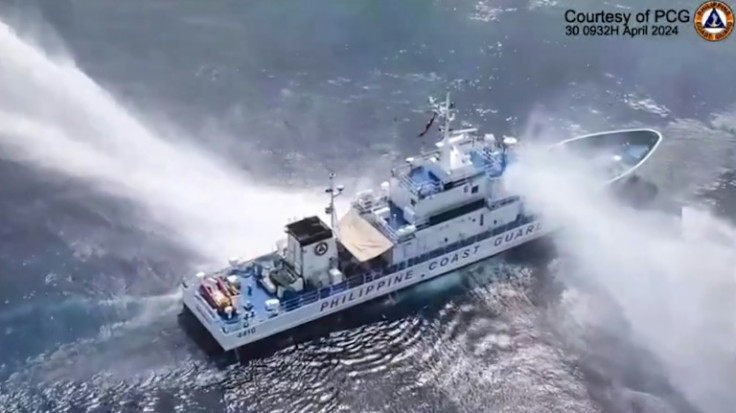
The Philippines said the China Coast Guard used water cannon on two of its vessels on Tuesday, causing damage to one of them, during a patrol near a reef off the Southeast Asian country.
Manila and Beijing have a long history of territorial disputes in the South China Sea, with several collisions involving Philippine and Chinese vessels in recent months, as well as the use of water cannon by the China Coast Guard.
The latest incident happened near the China-controlled Scarborough Shoal, which has long been a potential flashpoint, during a mission to resupply Filipino fishermen.
"This damage serves as evidence of the forceful water pressure used by the China Coast Guard in their harassment of the Philippine vessels," a statement issued by the Philippine Coast Guard said.
The China Coast Guard had also reinstalled a 380-metre (416-yard) barrier across the entrance to the shoal, a traditional fishing ground, blocking access to the waters inside, the statement said.
China's coast guard said it had "expelled" two Philippine ships from its waters near Huangyan Island, which is the Chinese name for the shoal.
China claims almost the entire South China Sea, brushing off rival claims from other countries, including the Philippines, and an international ruling that its assertion has no legal basis.
The triangular chain of reefs and rocks that make up Scarborough Shoal lies 240 kilometres (150 miles) west of the Philippines' main island of Luzon and nearly 900 kilometres from Hainan, the nearest major Chinese land mass.
China seized the shoal from the Philippines in 2012 and has since deployed coast guard and other vessels that Manila says harass Philippine ships and prevent its fishermen from accessing the fish-rich lagoon.
Tuesday's incident came as the Philippines and the United States hold a major annual military exercise that has infuriated Beijing.
Manila and Washington have a mutual defence treaty and recent confrontations between Philippine and Chinese vessels have fuelled speculation of what would trigger it.
Top US officials have repeatedly said that "an armed attack" against Philippine public vessels, aircraft, armed forces or coastguard anywhere in the South China Sea would invoke the treaty.
Philippine President Ferdinand Marcos said this month that US Defense Secretary Lloyd Austin had given assurances that the treaty would be invoked if another "foreign power" killed a Filipino soldier.
In the latest incident, a vessel belonging to the Bureau of Fisheries and Aquatic Resources (BFAR) and another from the Philippine Coast Guard (PCG) were delivering fuel and food to fishermen plying the waters near the reef.
"During the patrol, the Philippine vessels encountered dangerous maneuvers and obstruction from four China Coast Guard vessels and six Chinese Maritime Militia vessels," the Philippine Coast Guard statement said.
China Coast Guard vessels used water cannon against the BFAR and Philippine Coast Guard boat, it said.
The PCG vessel was sprayed from both sides, causing damage to its railing and canopy.
"Despite the harassment and provocative actions of the Chinese Coast Guard, both the PCG and BFAR vessels stood their ground and continued their maritime patrol," the statement said.
The Philippines found a floating barrier across the entrance to the shoal during a similar mission in September.
Philippine Coast Guard personnel then cut a rope tethering the barrier to an anchor, allowing it to drift, in a special operation ordered by Marcos.
Marcos has stood up to China's growing assertiveness in the waterway since taking office in 2022, insisting the Philippines "will not yield" as it defends its sovereign territory.




